Who, What, Why: Luke Godsey’s Appalachian quilt
The quilt, which goes on view April 12, is part of a new art series at the Penn Women’s Center.
Who
“There was a really nice process, because we would just sit and talk and quilt,” Godsey says. “It’s fun and it’s a really good emotional release; it can get your frustration out in a healthy way. When I was frustrated about school, I could sew and get mad at the sewing machine instead of bottling it up.”
What
Godsey still has that first quilt and uses it at Penn. Now a second-year student studying linguistics, Godsey continues to quilt.
Godsey’s latest project is a quilt commissioned by the Penn Women’s Center where Godsey also works. Godsey sewed 5-by-5-inch square scraps of fabric pieced together in blocks. The multicolored quilt is made of 20 blocks with each block containing five squares of one pattern and four squares of another.
That’s just the quilt top, notes Godsey. Underneath is a soft in-between layer, called batting. Godsey is using fusible batting, which is ironed into the top and the backing. Then, Godsey sews it all together, using a technique called “stitch in the ditch.”
“You sew vertically into every line and then you sew horizontally into every line, so it makes a grid on the back,” Godsey says. “That’s called ‘stitch in the ditch’ because it’s supposed to be hard to see the top stitch, because it’s in the crease of the other ones.”
The quilt is part of a new art series at Penn Women’s Center and will be unveiled at the Center on Friday, April 12 with a reception and artist’s conversation from 4 to 6 p.m.
Why
This work is Godsey’s first commission. “I’ve always been wanting to do a quilt for the center, just to make it feel like more like a home,” Godsey says.
“It also truly is a connection to back home, because by car, I’m about 12 hours away,” Godsey says. “When I came to Philly, I felt like I lost community,” Godsey says. “I was looking for a place to build community and learn about other people.”
Appalachia has his own unique culture, Godsey says, very different from that of Penn and Philadelphia. Godsey is also one of the few students from Kentucky on campus. “It’s that immediate isolation from home,” Godsey says. “The process of making this quilt has been really cathartic, to work through finding my identity—and also to hold on to my identity in a new place.”
Archiving Materials That Reflect A ‘Shared History’
In 1969, a group of women met to talk about women: their bodies, their sexual health, their reproductive rights, and their experiences with doctors and medicine. A year later, these women put together a 193-page course booklet and in 1971, retitled it “Our Bodies, Ourselves.” Now a cult classic, the book has sold more than 4 million copies, been translated into 34 languages, and been banned from high schools and public libraries.
“Our Bodies, Ourselves” is now out of print. But an old, yellowed copy, dated 1971, stapled at the corner, and priced for 75 cents, for years existed in a box in Fisher-Bennet Hall. This spring, it will move to the Kislak Center for Special Collections, Rare Books, and Manuscripts, as part of the formal archiving of all the historical materials from the Program in Gender Studies and Women’s Studies (GSWS) and the Penn Women’s Center, both of which are celebrating their 50th anniversary this year.
Gwendolyn Beetham, associate director of GSWS, says that in the run-up to the 50th anniversary, she and Elisa Foster, director of the Penn Women’s Center, realized that none of their documents were housed as accessible archival material. “We wanted to get them out of boxes in people’s offices or basements,” Beetham says.
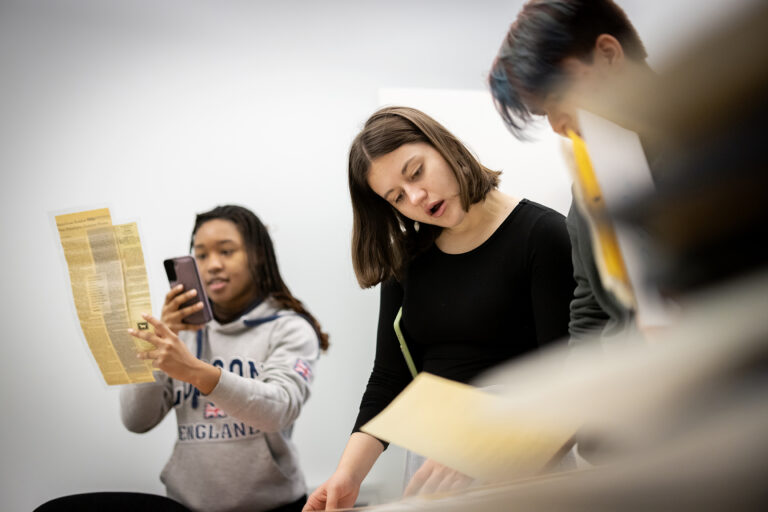
Alicia Meyer, curator of research services at the Kislak Center, says she’s had researchers come in looking to see and ask to see “this OG copy of ‘Our Bodies, Ourselves.’”
“People will ask me, ‘Do you have it? Do you have it?’ And I’m like, ‘Well, I know where one is …’” Meyer says. Archiving the materials will make them more accessible for researchers, she says, who can view the library documents in the sixth floor reading room at Van Pelt-Dietrich Library. Any materials specifically relating to Penn will be located in University Archives, and all will be available to the public.
The material is saved in context, with newspaper clippings pointing to larger national issues, says Meyer. “It’s great when you can connect those other sources to the history of Penn, because I think it really affects students and helps them see their own role in the history of the institution.”
“I’m a feminist, and it was really helpful to have professors who helped me study feminism,” says Marielle Cohen, who graduated in 1991 from the College of Arts & Sciences with a degree in sociology and in 1992 with a master’s in social work from what is now the School of Social Policy & Practice.
While at Penn, Cohen advocated against sexual assault and attended “Take Back the Night” rallies. In her second year as an undergraduate, Cohen began volunteering as a rape crisis counselor for the Philadelphia Center Against Sexual Violence, eventually serving in the emergency room at Jefferson Hospital.
“Issues of equality affect all of us, all of our lives,” she says.
Using the materials in the classroom
The archival material also includes documentation of the histories of Special Services and Penn Violence Prevention, Foster says. Penn Violence Prevention grew out of the Women’s Center, which continues to serve as a safe space and offers education to students and employees about preventing interpersonal violence.
“We have this shared history,” Foster says of GSWS and the Women’s Center. “The same people who were pushing for the Women’s Studies program were pushing for a women’s center and advocating for the safety of women on campus in their everyday lives.”
This semester, the Center also served as a classroom, where Beetham’s course Trauma Porn to Title IX: 50 Years of Anti-Violence Activism at Penn met to go over the archival material before it moves into the University Archives and the library system. Students have pored over program flyers, course materials, and handouts about interpersonal violence, sexuality, and resilience. There are saturated photographs of Anita Hill during her 1992 visit to Penn, a proclamation from City of Philadelphia declaring “Penn Women’s Center Day,” and a poster advertising a lecture on eating disorders. “Not Just a White Girl’s Thing,” it reads.
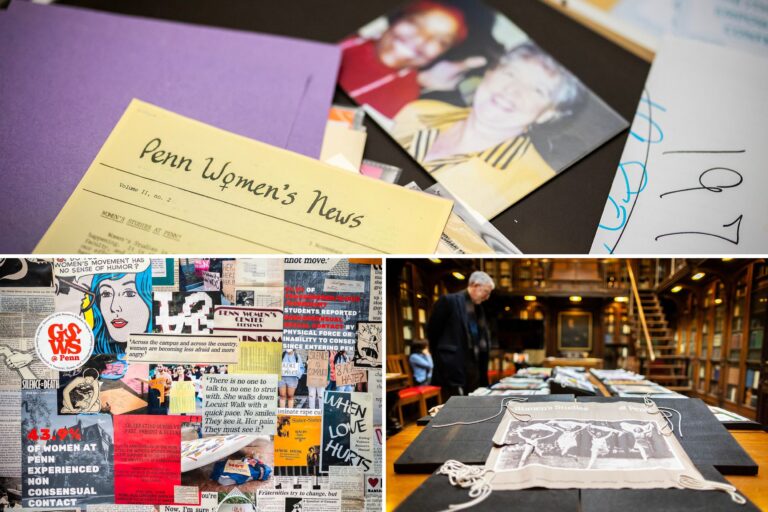
The students have been particularly drawn to material from the 1990s, a decade whose music, fashion, and iconography resonate with Gen Z. Plus, the ’90s mark the transition from black and white to color, with photographs and posters becoming more commonplace.
Chiara Bruzzi, a third year from Miami majoring in materials science and engineering, found a flyer from the ’90s that read, “If we don’t have abortion, what will we do?” Next to those words was an image of a coat hanger, a once-common reminder of the history of reproductive rights.
New Faces, Same Mission: 50 Years Of The Penn Women’s Center
Content warning: The following article includes mentions of rape, sexual violence, and murder, and can be disturbing and/or triggering for some readers. Please find resources listed at the bottom of the article.
In the early ‘70s, news of sexual assault on campus traveled in the forms of rumors and whispers.
“No one could confirm what was really happening,” Carol Tracy (C ‘76) says. “Because of the rumor mill, we didn’t know if there was one [assault] in Houston Hall or five.”
Before 1973, no woman on Penn’s campus was thinking about safety, or at least no woman that Tracy knew. But when the stories of sexual assault around campus began circulating, this changed.
From Tracy’s perspective, the rumors were largely ignored by Penn’s administration, contributing to a climate of fear for women on campus. When two nursing students were gang–raped in the SEPTA station at 34th and Chestnut streets in March of 1973, a group of Penn students decided they could no longer ignore the problem.
Tracy had been previously involved in feminist activism at Penn. She came to Penn as a secretary in 1968, taking night classes until she was able to enroll as a full–time student. Throughout that time, she was focused on a union movement for secretaries. But in 1973, her activism focus shifted to sexual harassment.
In April of that year, students and community members organized a sit–in at College Hall that would eventually lead to the founding of the Penn Women’s Center. The PWC still exists, offering a community space for gender equity on Penn’s campus, Director Elisa Foster says. Fifty years after the sit–in, their mission remains the same, even if the faces who are leading it have changed.
1973 was the height of the second–wave feminist movement, when equality for women was at the forefront of social activism. The Equal Pay Act was passed in the previous decade, prohibiting sex–based discrimination. Title IX had been enacted the year before, ending Penn’s gender–segregated honor societies. In January of that year, the United States Supreme Court ruled on Roe v. Wade, protecting abortion rights.
“With Title IX, people weren’t even thinking about sexual harassment,” Tracy says. While the Equal Pay Act, Title IX, and Roe v. Wade were legal victories, “sexual assault and domestic violence was the one issue that didn’t come from legislators but from grassroots movements.”
This grassroots organizing approach is what fueled the sit–in at College Hall. Efforts to start a Women’s Studies program at Penn were well underway, and students began to consider the best way to handle the assault rumors on campus. Survivors weren’t the ones to come forward; rather, it was students worried about it happening to them.
The students had previously met with the director of public safety to learn more about what was going on and how to stay safe. In the meeting, he offered them advice: Don’t wear provocative clothing.
“My response was, ‘I should be able to walk down Locust Walk buck naked and it’s still your job to protect me,” Rose Weber (C ‘75, L ‘96) says. “That meeting was the real catalyst that just got us mad enough that we decided we needed to sit–in.”
A few days after the meeting, Robin Morgan, radical feminist and author of Sisterhood is Powerful, came to give a campus talk by invitation from the English department. “She said, ‘You absolutely have to do something. This can’t go on,” Tracy recalls.
So students gathered in the Christian Association basement to make a plan. “Any story about the development of the Women’s Center has to take the CA into account,” former CA intern Betsy Sandel says. Later renamed Concern through Action, the anti–war movement had just ended, and the CA had been “the place for everything” throughout the protests. The students returned there to plan.
Their decision: a sit–in, one of the first all–women sit–ins on a college campus, and among the most influential.
“This was truly a collective moment,” Tracy says. “Students and community members worked really closely together to create a safe space for women on campus.”
Former Psychiatry and History professor Caroll Smith–Rosenberg and Tracy were the key negotiators, sitting around a table in College Hall with the president, provost, dean of students, and several other administrators.
They presented the group’s list of demands, which included better lighting on campus, a bus service, alarms in bathrooms, staffing of a senior–level policewoman to support assault survivors, the right to bring their dogs to class, and of course, the Women’s Center.
As they negotiated, over 200 students and community members occupied College Hall. “We just congregated. It was a huge number of people,” Sandel says. “And it wasn’t just all women. There were lots of male faculty and male students too, but mostly women, just congregated in the hallways.”
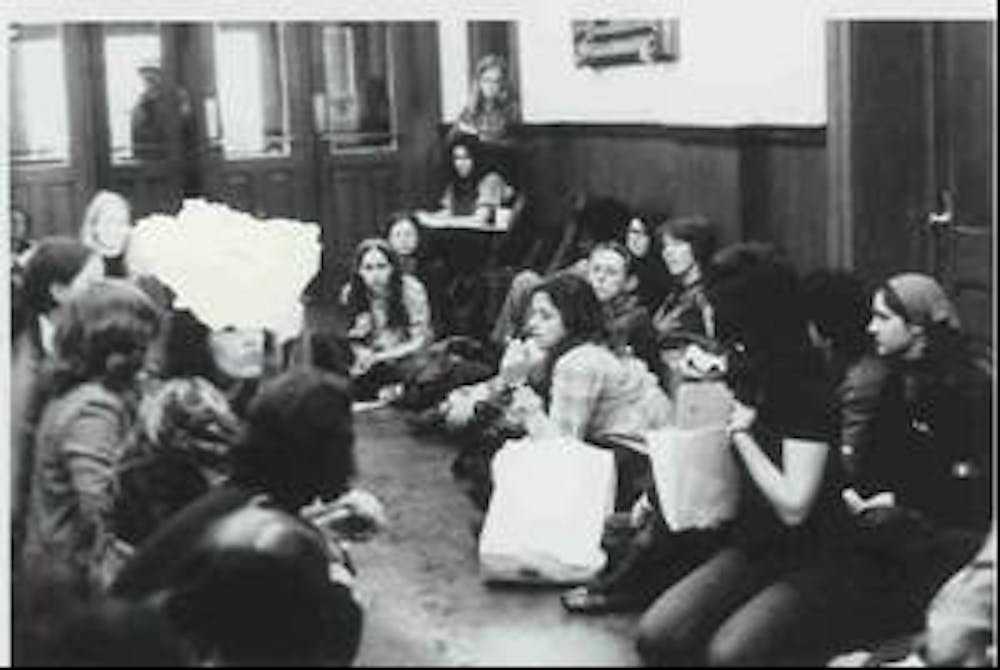
The group was careful not to violate open expression guidelines. They lined the hallways, ensuring they didn’t prevent anyone from entering the building or getting to their classes. Local restaurants provided food, and they slept in sleeping bags on the floor for four days.
As Tracy and Smith–Rosenberg continued negotiations, the dean of students received a note requesting their permission to rent College Hall 200, which had been the protest hotspot of the anti–war movement. He was surprised, telling Tracy that protests usually don’t rent the room. “Well, I’m sorry,” Tracy recalls Smith–Rosenberg responding. “Women are overly socialized, and we’re just going to stay until this is over.”
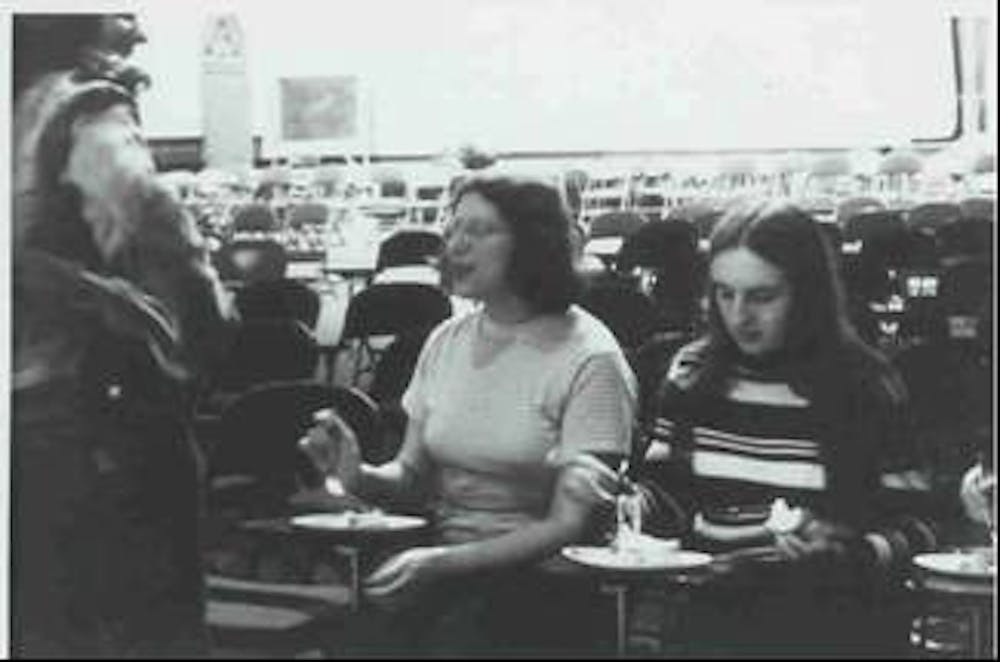
When Friday rolled around, the College Hall security guards were under the impression that the protestors would pack up and go home for the weekend. “By late afternoon, they realized we were really and truly going to stay as long as it took, and they basically caved,” Weber says.
Negotiations were straightforward. Every demand was met, much to the organizers’ surprise. In fact, Weber never expected the Women’s Center to become a reality—it was a throwaway demand, designed to be something they were willing to give up during negotiations.
“It was pretty clear the University had to do something,” Sandel says. “There was serious fear and danger, plus a public relations crisis.”
Getting the center off the ground was a “process,” according to Weber, but a process that moved quickly. Housed in Logan Hall (since renamed Claudia Cohen Hall), the PWC became a place for women to connect with each other and engage in activist work.
They also developed educational opportunities, including the Free Women’s School, a ‘courses without credit’ program offering women from Penn and the greater Philadelphia area an education in “areas not usually offered in the college curriculum,” Sandel says.
“A Place I Could Be Myself”
The Penn Women’s Center celebrates five decades of providing advocacy, advising, refuge, counseling, company, and tea. From its origins in the struggle against campus sexual violence, the center has evolved to tackle a range of concerns, from wellness to combating racism. The latest debate: Is its name, meant to be welcoming, too restrictive or exclusionary at a time when gender itself is contested?
On a mild late-summer afternoon, soon after the semester’s start, a purple-and-white banner announcing an open house is attracting both the avid and the merely curious.
“I’m a woman. I like to be in spaces where other women support each other, and that’s obvious when you see the words ‘Women’s Center,’” says Leigh Monistere GrEd’28, a first-year student at the Graduate School of Education. The founder of a literacy nonprofit, she is among a stream of students investigating the Penn Women’s Center, housed in the former Theta Xi fraternity house at the corner of Locust Walk and 37th Street.
On the porch, visitors snag free T-shirts celebrating the center’s 50th anniversary and proclaiming, “Growth. Action. Solidarity.” Inside, they crowd around a table to iron decorative decals onto pouches with the center’s logo.
There’s free food, too: chocolate-covered pretzels in the living room, cheese and fruit in the eco-kitchen, with its energy-efficient appliances, cork floors, and cabinets of reclaimed wood. In the backyard garden students chat with Women’s Center staff over lavender lemonade and iced English breakfast tea. On the patio are chiseled quotes by women writers and other icons of feminism and civil rights. From Alice Walker, author of The Color Purple, comes this gentle observation: “In search of my mother’s garden, I found my own.”
Since 1973, the year of its founding, the Penn Women’s Center—which relocated in 1996from Houston Hall—has been a refuge, gathering place, and resource center for the Penn community, including faculty and staff: women mostly, but also sexual minorities and the gender nonconforming, and sometimes their straight male allies.
“The Penn Women’s Center was also a home for young gay or LGBT students,” says Daren Wade C’88 SW’94, now associate director of career development at the University of Washington’s School of Public Health. “It was very much a place that I felt like I could be myself.”
Mika Rao C’96, who was president of the South Asia Society at Penn, says she relied on the Women’s Center to help a friend with financial problems stay in school. When members of the South Asia Society faced an incident of racial intimidation, “the first thought I had was, ‘Let’s call the Penn Women’s Center,’” says Rao, now managing director of williamsworks, a philanthropy consulting firm. “What I found was that the Women’s Center was just there to support women, period, and [help them] navigate a very large, complex university system.”
Born out of concerns about sexual violence, the center also has provided a locale for a meeting or hangout, a cup of tea, career advice, quiet study, or confidential counseling. Programming over the years has tackled the nuts-and-bolts feminist issues of sexual harassment, pay equity, and reproductive rights, but also wellness and carpentry skills. The center has been at the nexus of University-wide struggles to better the status of both women and minorities, helping to spawn a range of affinity and activist groups. It was intersectional and anti-racist long before the terms became buzzwords.
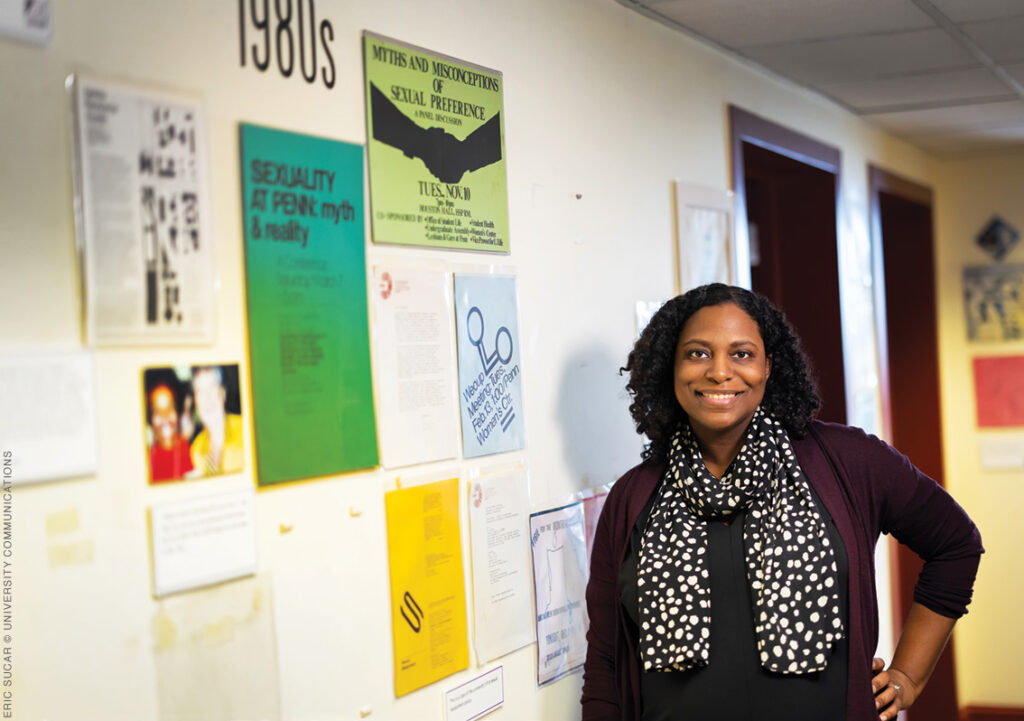
But much of its agenda wasn’t explicitly political. In recent years, new mothers—including the center’s current director, Elisa C. Foster—could avail themselves of a lactation center. A small crafts room provides yarn, fabric, and a sewing machine. Along with feminist classics, the library offers poetry by Anne Sexton, Jeffrey Eugenides’ novel Middlesex, and the stories of Gertrude Stein. A 2017 volume titled Crafting the Resistance: 35 Projects for Craftivists, Protestors, and Women Who Persist has helped inspire center programming, Foster says.
The Women’s Center’s conference room is temporarily overflowing with stacks of newspaper articles and other documents. In honor of the anniversary, Foster is assembling an archival display that will debut during Homecoming Weekend. Spring semester events will include a joint symposium with the Gender, Sexuality, and Women’s Studies Program [see sidebar] and a May 18 celebration during Alumni Weekend.
The yearlong anniversary also will be an occasion for the Women’s Center to reevaluate its mission—and its name. “Nationally, at universities across the country, their Women’s Centers are changing their names to Gender Equity Centers,” says Foster. “We hear it from the students, we hear from the community that we serve, we hear it from the national trends.” A name change isn’t happening this year, but “it’s not off the table,” Foster says.
Director Elisa Foster leads the Penn Women’s Center as it approaches its 50th anniversary
The Penn Women’s Center occupies three-quarters of a three-story house tucked off Locust Walk, with a front garden dotted with clumps of hellebores and daffodils during the spring. It has a full kitchen, a barbeque in back, and rooms that can be reserved by anyone on campus, with first preference going to student groups.
Founded in 1973, the Center works with students, staff, and faculty to promote gender justice and support personal and professional development. It’s a place where advocacy, equality, and wellness come together, says Elisa Foster, the director. It is a warm and caring house, filled with warm and caring people with interests ranging from sustainability to anti-violence to sex positivity, she says.
Although recently appointed director, Foster has worked for the Center for more than six years and has almost 20 years of experience working at the intersection of racial justice and gender equity. This was the first job that felt like home, she says. When her young son visits, he calls it “the work house.”
“A lot of the things that I’m passionate about are part of the reason why I do this work. I’m a mom. I have a 5-year-old. I have one coming in a few weeks,” Foster says. “When I started working here at the Women’s Center, I was the main person downstairs using our lactation room. So, I got a first-hand experience of what it means to support parents on our campus. And I think that made me an even better advocate for a lot of the folks that we work with and a lot of the people that come to the Center needing support, who are caretakers or who are nursing or are new parents,” she says.
Foster is also a breast cancer survivor. “That’s how I spent COVID, in chemo.” Going through that experience made her even more passionate about reproductive justice and health care for women, she says.
“When we talk about wellness and balancing our lives and academics and jobs, these are all things that I’ve always felt really passionately about because they’ve always been things I’ve had to balance,” Foster says.
“I think Elisa is one of the primary reasons why the Women’s Center has such a welcoming environment,” says Hannah Goldberg, a musicology and English major from Kansas City, Kansas. Goldberg, who graduated in December, works full-time for the Center supporting student initiatives and heading its wellness and sustainability programs.
Goldberg describes Foster as a compassionate leader and exceptionally approachable. “Everyone at Penn is running around,” Goldberg says, “but she’s so present with everyone she meets.”
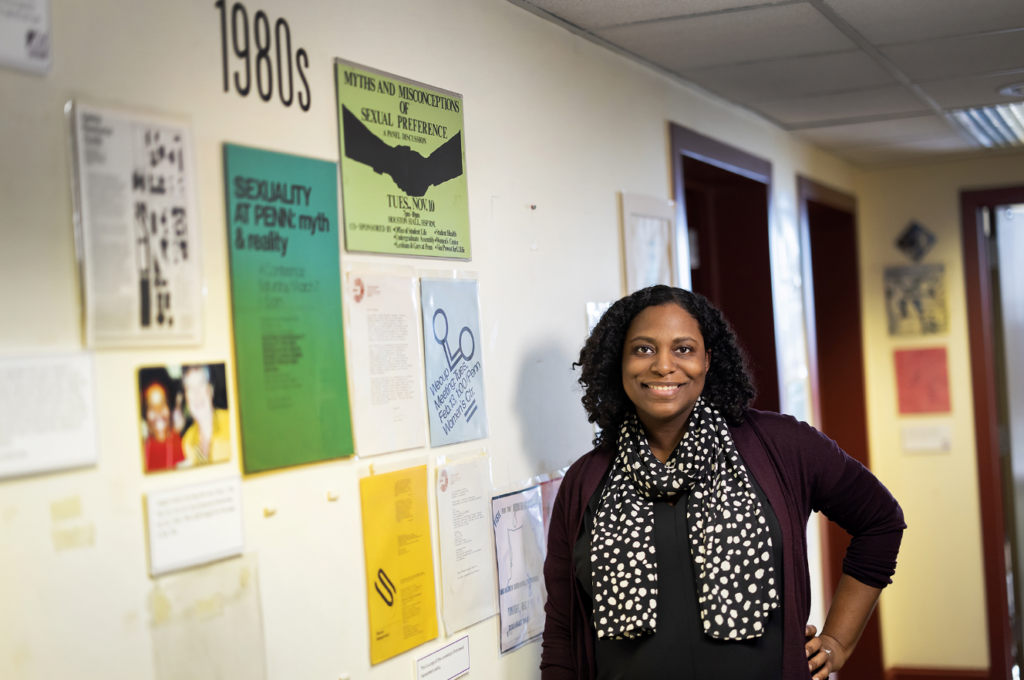
For three hours on a sunny March afternoon, the Penn Women’s Center ebbs and flows with students looking for a place to study, a group of women discussing Gender Equity Week with flyers and stickers and an Instagram rollout strategy, and some 15 high school students here for a reading group. There are snacks. There are gel rollerball pens. There is loose-leaf tea. But as warm and nurturing as the Center is, it’s also a serious place to discuss serious issues.
The upstairs hall of the Center serves as an ad hoc museum, with flyers and posters from almost 50 years of history. Founded in 1973 as an anti-violence initiative, violence prevention is still a big piece of the Center’s work.
“We’re a confidential resource,” Foster says. That means that students, staff, or faculty can come to the Women’s Center, talk about what’s bothering them, and get some help. “We do what we call crisis options counseling, which means they come in with whatever their concern is—and that can range from sexual violence to discrimination in the classroom to a conflict they have with their roommate—and we give them we give them all the options and resources that they have here on campus and off campus,” she says.
The center works closely with Penn Violence Prevention and also hosts a pre-orientation program with Penn Association for Gender Equity. This allows people to come in and learn about violence prevention in a small, safe setting, which can later be shared peer to peer, Foster says.
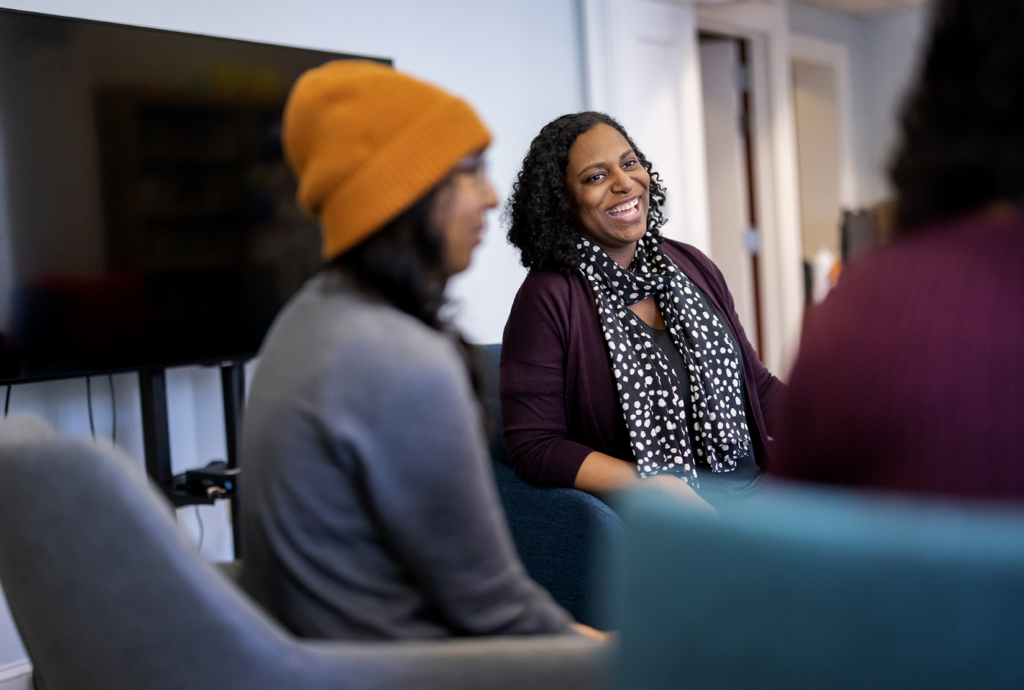
Women’s Center staff also serve as mentors, advising student organizations, as well as helping them logistically and financially, says Hitomi Yoshida, the Center’s coordinator. “We encourage students to voice their ideas, so they have more opportunity to practice their activism and engagement on campus.”
This often means collaborating with the cultural resource centers or with community groups on projects that might advocate against anti-Black violence or facilitate access to menstrual care. The staff supports the issues the students take on and the nature of this work evolves as the national landscape evolves, Foster says.
Although Foster is the director, she says she leads without pushing. She creates space for everyone to talk and later comes in with suggestions or encouragement. “That collective framework has been built into the Center,” Foster says. “Historically, we’ve always felt that everyone’s voice was really important.”
As it moves toward its 50th anniversary this fall, the Center has become even more gender inclusive. “The name is Women’s Center, but all are welcome,” Yoshida says. “We are a welcoming space to build community around gender justice.”
People of all genders have played a role in anti-violence initiatives like Take Back the Night, Foster says. In partnership with Penn Violence Prevention, the Center advises and mentors the student organization Abuse & Sexual Assault Prevention, which plans and sponsors the annual Take Back the Night rally.
It is an event where the campus comes together to protest sexual violence and rally to support survivors, which is reflective of the foundation of the Penn Women’s Center, Foster says. “Fifty years after the Women’s Center was created, we’ve made tremendous strides in offering resources to protect our community, but we still have a long way to go to eradicate interpersonal violence and establish and gender equity. This continues to be at the core of our work.”
Q&A With Elisa Foster, New Director Of Penn Women’s Center
Congratulations on your promotion to Director of Penn Women’s Center. What does it mean to be the new Director of Penn Women’s Center (PWC)?
It means so much. I’ve been working at the Women’s Center for almost six years. With the relationships that I’ve developed with students and colleagues, it means a lot that I can lead Penn Women’s Center into the future as we celebrate our 50th anniversary. I want to take the relationships and important memories that I’ve made during the last six years and amplify them to the next level.
Tell me a little bit about your background and how you got to Penn.
I started out working in the nonprofit industry doing grant writing and strategic planning for organizations in Philly. I was a consultant working with a few organizations locally. Then I moved into market research, which was an interesting move, but it all kind of tied together because a lot of the clients I was working with were nonprofits and educational institutions. At the time, I was also working on my master’s degree in communication studying media representation of women and black communities Nonprofit consulting piqued my interest in higher education because I was working with a lot of universities on how to best meet the needs of their constituents, which has always been a focus of my work. I was doing projects for schools like Penn State and Lutheran Theological Seminary, thinking about how best to meet the needs of their students and their faculty. As I was contemplating my next career move, I ended up finding a position at Robert Morris University in Pittsburgh.
What role did you have at Robert Morris?
Robert Morris was starting a Women’s Leadership and Mentoring Program, and I was the program manager. It began with me and the faculty director, starting this program from scratch. It was an important initiative for the University because, unlike most colleges, Robert Morris has fewer women students than male students.
It is because Robert Morris was traditionally a business school, right?
Exactly. They created this great mentoring and leadership program to encourage more women applicants and to create supportive connections among women students, faculty, and alumni. I worked there for three years, and then Philly pulled me back. In 2017, I saw the opening for an Associate Director position at Penn Women’s Center and said, ‘Oh, that’s perfect,’ because it marries my work supporting women and addressing issues around gender equity. The role at PWC positioned me to do the work on a broader scale, reaching areas of campus and the community that I did not have access to at Robert Morris. I love that PWC is a confidential resource; offering that kind of support to people in our community is important.
As one of the oldest women’s centers in the country, what does it mean, for both Penn and PWC, to celebrate the 50th anniversary?
It’s interesting because of this moment in time where women and people who identify as gender minorities have made leaps and bounds of progress. People are intentionally making more inclusive spaces. Women are excelling in areas where they were previously underrepresented. But, at the same time, we’re still dealing with a lot of the issues that were present 50 years ago. For example, the reversal of Roe v. Wade, which we should have been acknowledging the 50th anniversary of this year, is something that I think a lot about. We thought we were further ahead with issues around reproductive justice. It feels like we are taken right back to 1973. It’s been interesting to reflect on how far we’ve come but how much more work we must do.
What is the history of the PWC? Who founded it? Why was it established back in 1973?
The Penn Women’s Center was a result of student, faculty, and staff activism right here at Penn. There were a series of sexual assaults happening on campus. Women didn’t feel safe where they were receiving their education, where they were teaching, where they were working. In the Spring of ‘73, there was a sit-in at the President’s Office, and they had a list of demands. One of those demands was a Women’s Center that can offer resources to students. One of the other demands was a Women’s Studies Program, which is now the Gender, Sexuality, and Women’s Studies program. Another demand that has had a lasting impact was the creation of the Department of Special Services, housed in the Division of Public Safety. Penn Women’s Center started out as an administrator in an office, and we’ve grown. In 1996, we moved into the house here on Locust Walk. Since then, we’ve been able to add to expand the resources and provide support to student groups.
Can you reflect on how PWC’s role on campus has changed over the past 50 years?
A big part of what we have done in the last few decades has centered on gender equity, and inclusion of all gender identities. We want to make sure that, regardless of who you are, you know that you come into the Women’s Center and receive care and support. That’s one thing that’s been really important! Especially including and uplifting our trans and nonbinary communities. We also continually work to bring in communities of color, who historically have felt isolated from women’s movements throughout history to make sure that everyone has a place here, and they can receive support. We’re called the Women’s Center, and that has always been central to the empowerment and upliftment of women. But we also want to make sure that Gender Equity is at the foundation of what we do, and that our approach is intersectional.
What are some of the traditional programs and services that you provide at PWC?
One thing that has been consistent is that PWC is a confidential resource for students, staff, and faculty. Most often, that applies to people who experienced sexual violence and/or who experienced gender-based discrimination. But it also expands to a myriad of interpersonal situations: advising around conflicts with friends and classmates; dealing with health issues; trying to figure out where to go, what their next step is, what resources are on campus — we call it Options Counseling. We don’t provide counseling in the traditional therapeutic sense. We’re here to listen, validate an experience, answer questions, and then lay out the options that exist on- and off-campus to address whatever challenge or concern one may have. We’ve always worked with student groups and student organizations. We’ve worked with many groups throughout the years who need advising support, or just need mentorship or a home base on campus. We’ve been involved in a lot of the conversations around representation on Locust Walk and making sure that students of marginalized identities have a space to feel safe in the middle of campus. PWC is very privileged and fortunate to have this house, right in the middle of everything, but I know everyone doesn’t have that. We offer space to communities and student groups to support their needs, advocate for issues they feel are important, and open our doors to anyone who needs a safe space on campus – whether it’s to talk to a staff member in a confidential setting, attend a wellness program, or nap on the living room couch in between classes.
What has been planned for PWC’s 50th anniversary celebration?
We’re still in the early stages of planning. First, we are going into our archives and updating the records because during the 40th anniversary, we did an archive display and we now have another decade of programs and accomplishments to add. We’re working with University Life’s Strategic Planning & Operations team to digitize PWC’s archival records. We’ve been working with our student team to get everything organized. The archive project will be important because it will highlight the timeline of Penn Women’s Center’s origins, beginning with photos and Daily Pennsylvanian articles. It will also highlight everything that’s happened and evolved over the past 50 years. For the 40th anniversary, we also started a video project called the Voices of Change. We’ll be doing some more of that oral history work to make sure the voices of PWC’s community are captured. We will kick off the celebrations with a program during Homecoming this fall. We will also co-sponsor a symposium organized by Gender, Sexuality, and Women’s Studies in Spring ‘24 to celebrate both of our 50th anniversaries.
That sounds so exciting. As you enter the Directorship, what are some of the challenges that PWC faces? What are some of the expectations that you have moving forward?
A lot of universities are contemplating the same questions as they imagine the future of their women’s centers. Some centers have changed their names, transitioned into centers for gender equity, and some have combined with their institution’s LGBTQ+ center. As director, I want to determine what the next best step is for PWC at Penn. I want to listen to and engage with our community and figure out what that means. I look forward to doing a listening tour and focus groups, having conversations with our students, alumni, staff, and faculty. We want to make sure we’re acknowledging the experience of people who have been coming to the center for many decades, but we also must ensure that we’re meeting the current needs of our students and figuring out what that balance looks like for a Women’s Center at this particular point in time. I’m excited to embark on this journey but it’s a very difficult question and challenge to solve. That’s what I am most excited for. On top of that, I am excited to continue building our collaborations with students and many campus partners like Penn Association for Gender Equity, Wellness, Penn Violence Prevention and our fellow Cultural Resource Centers.
Penn Women’s Center Supports Black Girls Literacy Project
Sophia Parker looked at the array of photos of Black women in front of her, thinking carefully. The 16-year-old from North Philly picked up one of a middle-aged woman dressed to impress, and another of a younger woman with her family. Parker then told the other girls participating in the Black Girl Literacies Project last fall why she was drawn to those images, she recalled.
“When I get older, I want to see myself being a classy woman with my pearls and just being happy with life, knowing that I succeeded in some type of way,” she said. “One day, I would like to have a family and see [them] grow and be successful.”
The other girls did the same that day, using the photos to talk about how they saw themselves and what they wanted out of life. It was a different kind of practice than Parker had ever heard of, but over the course of several weeks in the program, she came to understand herself better.
“It gave me a new outlook on ways to love myself,” she said.
The Black Girl Literacies Project is a free program for Black girls in Philadelphia, where participants explore different ways of loving themselves. Registration is open for the project’s Spring cohort, which begins on Feb. 15 and meets every other week. The program is for Black Philadelphia girls ages 14 to 18, and meets at the Penn Women’s Center, but also holds additional sessions at places such as the Colored Girls Museum in Germantown.
Barrett Rosser, the creator of BGLP, is a doctoral student at the University of Pennsylvania after previously working as a Philadelphia school teacher for over 10 years. She started the project in 2020 as part of her doctoral dissertation. “[Black girls] sit at the intersection of racial and gender [oppression],” she said, explaining why it is essential for Black girls and women to practice self-love.
